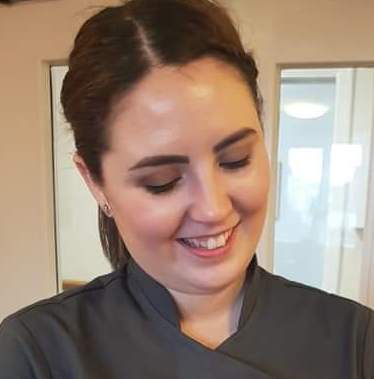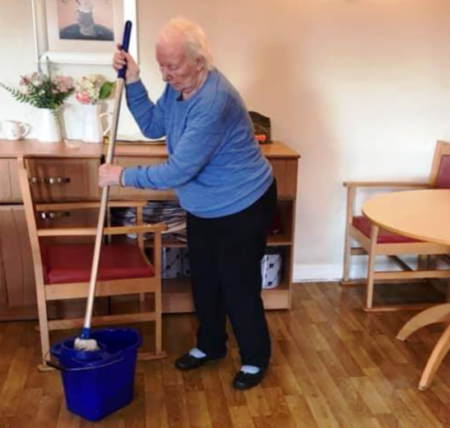Home News & Views The Six Rights of Activities
The Six Rights of Activities
Karen Davies (Home Manager) and Lucy Hodge (Skills for Care Graduate)

Who says you can’t? This is our ‘go to’ response when we meet resistance in Rose Court, an HC-One care home offering residential care, nursing care and dementia care. How often do you hear ‘she can’t take part in that activity, she’s on a puree diet’, ‘he can’t go on that trip, he’s got dementia’ or ‘no point in asking him, he never wants to join in with anything’. There are many reasons why people living in a care setting are not involved or included in planning and taking part in activities.

Being cared for in a bed rather than being out and about in a communal area can lead to the person being forgotten. If you imagine a bed with bed rails as a 6ft by 2ft prison, then you are totally dependent on the creativity and endeavour of the care team to ‘break you out’ of that prison. Imagine you very much enjoyed restaurants and eating out before you moved to live in a care home, and are now denied the experience of visiting a café or restaurant with your peers because you are recommended a puree diet.
Being risk averse when providing care to people who are vulnerable is understandable. Being safe and keeping people safe is what we do after all. It became apparent over a period of time, that people living in some care provisions were being denied access to activities that were meaningful and which enhanced their well-being. This was due to staff teams not considering or understanding the individual’s needs and registered nurses, managers and families being fearful of risk.
As a Home Manager I wanted to free up residents and staff to think differently about the provision of activities. A few years ago, myself and a well-being coordinator discussed the barriers and resistance she and in particular her peers faced. We struck on the idea of adapting The Seven Rights of Medication (an international safe practice standard) and using our existing philosophy to activities provision to produce The Six Rights of Activity. The process provides a way to demonstrate the benefit of an activity and that any issues, requirements or risks have been considered, with all risks mitigated effectively. The aim of The Six Rights is to increase positive risk taking and improve an individual’s well-being. The process takes the power and decision making away from those who currently make choices (e.g. care givers, care planners, policy makers) and redistributes it to colleagues and the individual in care. The aim is to create solution-focused staff who are able to identify patterns and solutions, enabling an individual to get involved in an activity. The removal of obstacles and finding solutions whether this be the time of day, the type of activity, or the right support for the resident is at its core. Unfortunately, due to a number of other commitments, The Six Rights didn’t come to fruition when the idea was first developed.
This year the team at Rose Court were lucky enough to be involved in a graduate programme. As part of the programme, our graduate Lucy, needed to engage in a project that involved and benefitted residents and the operations aspect of the business. Following some discussion we agreed The Six Rights of Activity would certainly do that. Lucy understood and agreed with the basic premise and was asked to further develop the process. She referenced current CQC requirements, and the company policy and procedures around activities provision.
The Six Rights of Activities are as follows:
- The right activity
Is this the best outing/activity to match the resident’s assessed needs, wishes and choices? This should include real time choices and reflect the individual’s life story. It should include an assessment of the location of the external activity or any specific activities or tasks which may occur which pose a risk. Is this appropriate for the resident? Take into account the stage of dementia the resident may be at as to whether the activity is appropriate and how to make it appropriate.
- The right resident
Is the right resident attending the right activity to match the resident’s expectations and abilities? Take into account the stage of dementia the resident may be at, as to whether the activity is appropriate for their abilities, or consider altering the way the resident can participate to make it appropriate.
- The right time
Is the trip/activity at the right time of day and the right length/duration to best match the resident’s expectations and abilities?
- The right documentation
Have you completed the right assessment of need and risk for the resident? Have risk assessments been conducted, health and safety procedures followed, capacity to consent reviewed and safeguarding considered? This may also include resident mix, transport, medication (does medication need to be taken?), communication (mobile phone?), social skills, equipment needed and the right food and fluids. If a modified diet is required, liaise with the kitchen to organize this. You should then evaluate and evidence the experience to develop individual planned care.
- The right support
Will there be the right level of support? Have you got the appropriate staff/relative to resident ratio? Arrange additional staff with the Home Manager and staff team to meet the assessed needs of the planned activity (potentially staff training as first aiders). Has enough support been provided to the resident to help decide on participation in the activity? Are staff aware and available to give the right level of support to the resident depending on their abilities and the stage of dementia they may currently be experiencing? Who else can you involve in the process to ensure the right support is available? E.g. do you need to consult with a nurse, or do you need the assistance of maintenance or kitchen staff?
- The right reason
Is the right resident participating for the right reason? Has there been as assessment of who needs and wants the activity, to evidence choices offered to all and ensure inclusivity?
Quality of well-being is the foremost indicator of good care and in particular, good dementia care. It has been proven that in order to succeed in this manner, well-being should be measured by enabling staff to develop and work with practical tools and skills that enhance people’s well-being (Sheard, 2013). By adhering to this philosophy, Wren Hall in Nottingham saw a:
- 43% reduced incidence of falls
- 58% reduced incidence of expressed ‘behaviours’
- 35% reduction in the staff sickness figure
(see: https://www.dementiacarematters.com/pdf/modern.pdf, p.6)
It therefore seemed fitting that a document which equips staff with these practical tools or prompts, to encourage proactive solution-based thinking in regards to well-being activities, should be created to accompany The Six Rights of Activities.
The aim of this project was to create a document, with an evaluation to be completed for residents:
- who fail to get involved in many activities
- with dementia who staff may encourage to get involved in activities or who require specific conditions to get involved in activities
- who staff may argue pose a risk during activity provision, due to their medical needs and conditions
This checklist document aims to enable staff to evaluate the methods and solutions used to improve well-being for individual residents, in order to target future activity provision. An easy to read flowchart was also agreed upon, in order to provide a step by step process, which demonstrates how the outcome for residents during the activity provision process must always end with a ‘yes’ in regards to participation. Lucy and I decided there should be a procedure which explains in detail how the document should be used and this draws upon the policies and procedures that all staff must abide by at HC ONE.

During the initial early trial with residents and staff earlier this year, feedback was extremely positive. The document used evidenced residents participating in activities they had not done before, or staff recognising the best time or conditions for a resident to participate in an activity. The Six Rights of Activities has since been re-introduced at Rose Court with some alterations made to the initial documents following staff feedback. The process and documentation have also been introduced at another home locally, in order to compare results. This trial has not yet finished but results are looking extremely optimistic, with the initial reactions from staff being very supportive.
Rose Court and Wren Hall are participants in the Teaching Care Homes Programme, a partnership programme between Care England, the Foundation of Nursing Studies and the Burdett Trust for Nursing. See: https://www.fons.org/programmes/teaching-care-homes.
References
Sheard, D. (2013) Mattering in a dementia care home – The Butterfly Approach. Dementia Care Matters. Available from: https://www.dementiacarematters.com/pdf/modern.pdf. Last accessed 5th August 2019.
NSG 1101 – The “7 rights” of medication. Available from:
http://nursing-care.co.uk/BabyNursing/nursing-7-medication-rights. Last accessed 5th August 2019.
Comments are closed.

